The social media giant TikTok has found itself at a crossroads in the United States, caught between a legal tug-of-war and persistent operational uncertainties. Following a tumultuous week marked by congressional mandates and executive actions, TikTok’s future appears precariously teetering between acceptance and possible annihilation.
The legislative impetus for a potential TikTok ban stems from national security concerns surrounding foreign influence, particularly from China. The U.S. Congress passed the “Protecting Americans from Foreign Adversary Controlled Applications Act,” which aimed to compel the Chinese-owned app to divest its operations in the U.S. and ultimately prohibited its operation. Following the Supreme Court’s endorsement of the bill’s provisions, legislating a shutdown was imminent, leading to the app’s operational blackout over a haunting weekend in January 2023. Users were left in a state of limbo as both the app’s functionality and its availability came into question.
The abrupt enforcement of the law, however, was tempered by the outgoing Biden Administration’s decision not to take immediate action against TikTok. Instead, the onus of enforcement was placed on President Trump, poised for inauguration, who seemed to signal a potentially different path for the app. The short-lived window of indecision signaled to users and stakeholders alike that TikTok could still be used. Nonetheless, the legal implications of such usage loomed large, with app developers concerned that they might incur fines of $5,000 per infraction of the law.
Upon taking office, Trump granted TikTok a significant extension—75 days—to work through the complications posed by the bill. However, legal experts raised eyebrows at the retroactive nature of this extension. The specter of legal liability hung over myriad stakeholders, especially tech giants like Apple and Google, who expressed reticence about potentially facing hefty fines. These companies opted to keep TikTok off their app stores, prioritizing caution in a climate of legal uncertainty.
In stark contrast, Oracle’s willingness to back TikTok raises questions about selective compliance within this complex narrative. Despite Trump’s assurances that Oracle would not face penalties, it remains unclear what broader implications such endorsements could have on their business practices moving forward. The tension between legal compliance and operational interests sets the stage for a high-stakes game over internet governance, particularly as it relates to foreign applications operating on American soil.
The overwhelmingly bipartisan congressional vote—431 to 83—to enact a ban underscores a palpable sense of urgency regarding the perceived threats posed by TikTok. Details surrounding the briefings that informed such a substantial consensus remain undisclosed to the public, shrouded in national security classification. Even as President Trump maneuvered to maintain TikTok’s presence in the U.S. market, the apprehension among lawmakers signals a serious concern over data security and foreign influence, matters that could irreparably taint the platform’s reputation.
Trump’s position adds another layer of complexity. While he has indicated interest in negotiating a financial stake in TikTok—claiming a desire for the U.S. to own half of the application—this raises broader questions about how national interest intersects with corporate profit. Such a transactional mindset could distort policy-making processes in ways that prioritize financial gain over data security, raising alarms not only in Congress but among everyday users who rely on TikTok for connection and creativity.
As TikTok continues its operations amidst a bewildering legal backdrop, the lack of a clearly articulated strategy from its management team presents risks that cannot be overlooked. Trump’s signals regarding leniency and Oracle’s robust backing present a temporary reprieve, but without a cohesive plan to ensure compliance with U.S. laws, TikTok still operates under a precarious cloud of uncertainty.
Ultimately, the TikTok saga serves as a microcosm of larger conversations about digital sovereignty and foreign influence in a globalized world. Stakeholders must navigate a landscape where legislative mandates, executive promises, and national security imperatives all intersect. How this delicate balancing act will unfold in the coming weeks and months remains to be seen, but for the moment, TikTok’s fate hangs in a tenuous balance as it strives to affirm its legitimacy on the U.S. stage.

